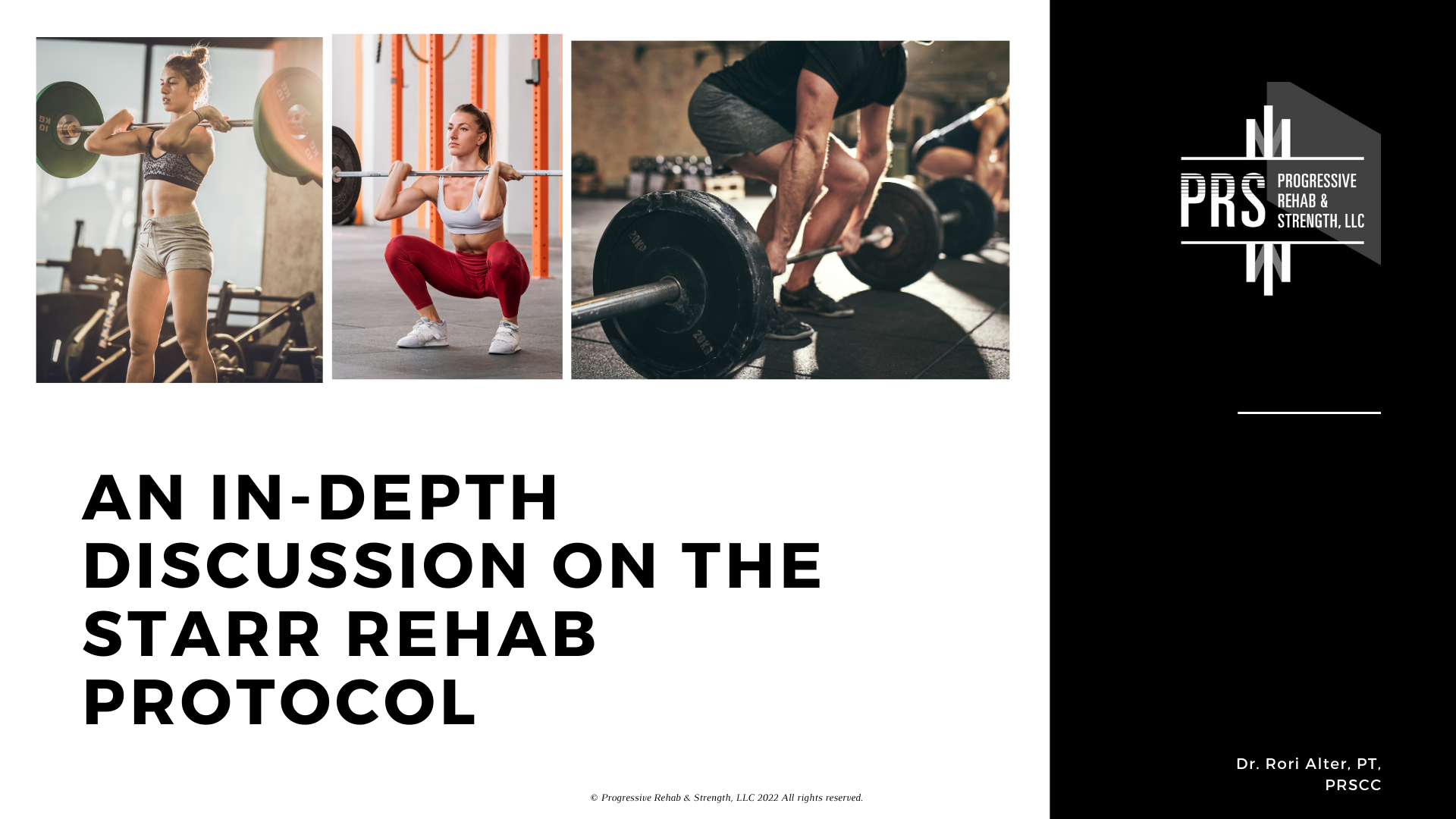PROGRESSIVE REHAB & STRENGTH
Webinars
Our pre-recorded webinars are a great way for you to expand your knowledge on various topics at your own pace and convenience. Watch on your own time, pause and come back to it if you need to, revisit key points you want to hear again, or listen on-the-go as you commute to work or train at the gym for up to a year.
Individual Webinars: $79 each
Bundled & Series Webinars: $119 for two (SAVE 25%!)
Management Of Incontinence In
The Female Powerlifter
Presenter: Dr. Rori Alter, PT, PRSCC
Total Lecture Time: 1:17:43
Total Q&A Time: 19:26
All About Lifting Shoes: Why We Wear Them, Who Needs Them, And How To Choose The Right Shoes For Each Lifter
Presenter: Dr. Alyssa Haveson, PT, PRSCC
Total Time: 1:05:52
An In-Depth Discussion
On The
Starr Rehab Protocol
Presenter: Dr. Rori Alter, PT, PRSCC
Total Lecture Time: 37:03
Total Q&A Time: 13:04
Olympic Weightlifting Simplified
Presenter: Joshua Wells, SSC
Total Lecture Time: 1:03:21
Total Q&A Time: 54:28
A Practical Approach To Pain Education
Presenter: Dr. Nicholas D'Agostino, PT, SSC, CSCS
Total Lecture Time: 47:36
Total Q&A Time: 18:03
Optimizing Powerlifting Meets: How To Successfully Plan For And Navigate The Competition As A Coach
Presenter: Dr. Alyssa Haveson, PT, PRSCC
Total Time: 1:00:28
The Surgical Treatment Of Cervical Radiculopathy
Presenter: Dr. Rori Alter, PT, PRSCC
Total Time: 45:42
Female
Athlete
Triad
Presenter: Dr. Breanne Maruca, DPT, WCS, PRS-CC
Total Lecture Time: 59:45
Total Q&A Time: 51:13
Efficacy Of Passive Techniques In Orthopedic Rehabilitation
Presenter: Dr. Alyssa Haveson, PT, CSCS, PRSCC
Total Time: 53:22
Diastasis Recti (DR) And The Implications Of Training With DR During Pregnancy And The Postpartum Period
Presenter: Dr. Breanne Maruca, DPT, WCS, PRS-CC
Total Lecture Time: 1:30:18
Total Q&A Time: 11:22
From Pec Repair To Benching: Safely And Efficiently Returning To Heavy Barbell Training
Presenter: Dr. Alyssa Haveson, PT, PRSCC
Total Lecture Time: 23:06
Total Q&A Time: 30:39
Weightlifting Belts: Who, What, When, Where, Why, And How!
Presenters: Dr. Rori Alter, PT, PRSCC and Dr. John Petrizzo, PT, CSCS, SSC
Total Lecture Time: 40:01
Total Q&A Time: 14:26
Osteoporosis And Resistance Training
Presenter: Dr. Alyssa Haveson, PT, PRSCC
Total Lecture Time: 23:22
Total Q&A Time: 44:51
Femoroacetabular Impingement Syndrome Part 1: Understanding FAI And Its Presentation In Barbell Strength Trainees
Presenter: Dr. Rori Alter, PT, PRSCC
Total Time: 42:52
Principles Of Injury Management In Barbell Training: Part 1
Presenters: Dr. Rori Alter, PT, PRSCC and Dr. John Petrizzo, PT, CSCS, SSC
Total Lecture Time: 42:02
Total Q&A Time: 19:00
Flaws In The Collegiate Strength & Conditioning World
Presenters: Dr. Rori Alter, PT, PRSCC and Dr. John Petrizzo, PT, CSCS, SSC
Total Lecture Time: 55:04
Total Q&A Time: 32:42
Scoliosis And
Leg Length Discrepancies In Barbell Training
Presenters: Dr. Rori Alter, PT, PRSCC and Dr. Alyssa Haveson, PT, PRSCC
Total Time: 1:17:17
Discussing Nutritional Needs During Musculoskeletal Injury Healing For Strength Athletes
Presenter: Dr. Christy Alexon, PhD, RD
Total Lecture Time: 54:12
Total Q&A Time: 22:07
Equipped Lifting: What You're Missing For Injury Management And Long Term Progress
Presenter: John Flagg, Clinical Athlete Head Powerlifting Instructor
Total Lecture Time: 51:09
Total Q&A Time: 40:46
Evidence-Based Practice For Coaches And Clinicians
Presenter: Dr. John Petrizzo, PT, CSCS, PRSCC, SSC
Total Lecture Time: 1:04:45
Total Q&A Time: 15:19
ACL Reconstructions And Physical Therapy
Presenter: Dr. Stacie Morris, PT, DPT, CSCS, USAW-L1SP
Total Lecture Time: 44:16
Total Q&A Time: 43:00
Femoroacetabular Impingement Syndrome Part 2: Understanding FAI And Its Presentation In Barbell Strength Trainees
Presenter: Dr. Rori Alter, PT, PRSCC
Total Time: 34:00
Principles Of Injury Management In Barbell Training: Part 2
Presenters: Dr. Rori Alter, PT, PRSCC and Dr. John Petrizzo, PT, CSCS, SSC
Total Time: 1:05:31
The Sumo Deadlift: Your Top Questions Answered
Presenter: Dr. Rori Alter, PT, PRSCC
Total Time: 30:13
© Progressive Rehab & Strength, LLC

























